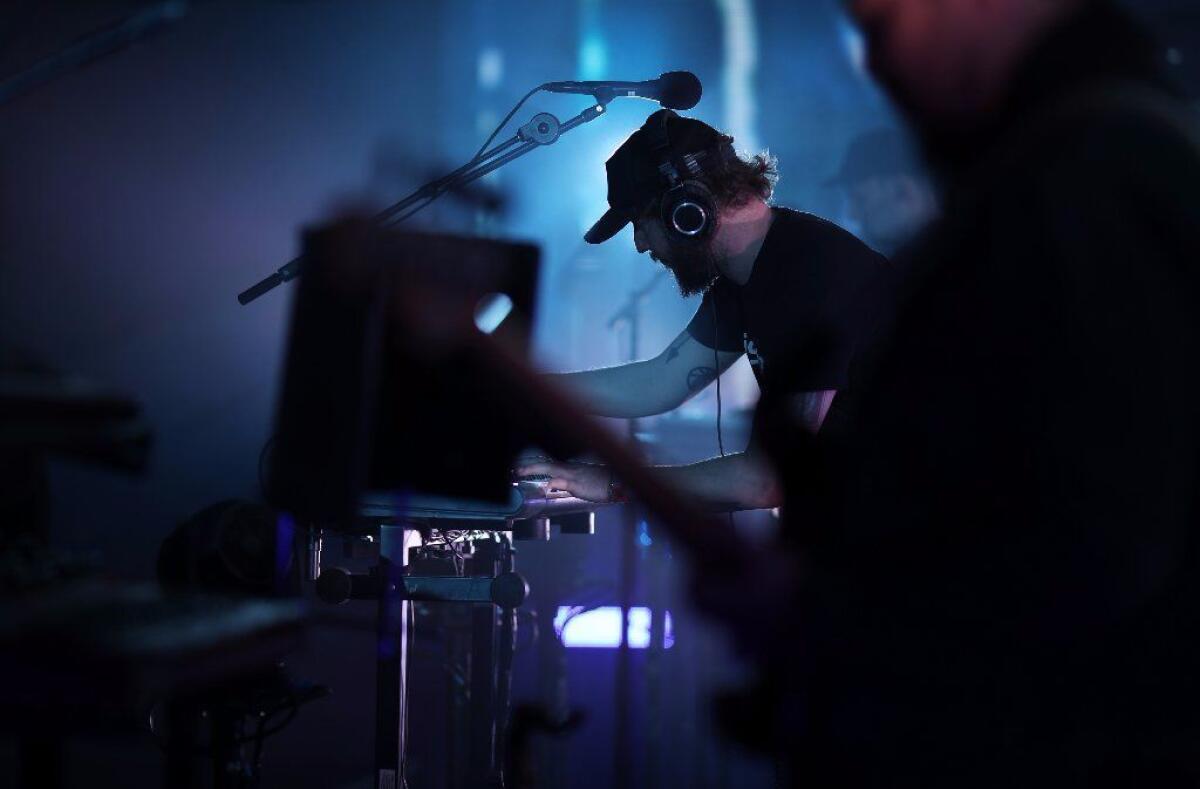On Bon Iver’s “i,i,” Justin Vernon ponders Trump, climate change and wider world

- Share via
“I can hear crying,” Justin Vernon sings on his new album as Bon Iver, and your first thought is: Well, of course.
Part of a loose confederacy of sad but soulful alt-pop artisans that also includes James Blake and Thom Yorke, Vernon has found big success (and two Grammy Awards) by exploring heartbreak and anxiety in carefully rendered recordings that show just where he puts all his obsessive energy. Since emerging in 2008 with “For Emma, Forever Ago” — the platinum debut he says he made while hunkered down by himself in his father’s hunting cabin in the woods of northwestern Wisconsin — he’s become such a reliable source of moody sensitivity that rappers from Travis Scott to Eminem now turn to him when they want to get in their feelings.
Yet it’s not his own well-documented pain that Vernon seems to be describing in “Naeem,” a stately ballad that comes halfway through “i,i,” which unexpectedly appeared Thursday on streaming services, three weeks before the album’s announced Aug. 30 release date.
“All along me, I can hear you,” he sings over a rippling groove of piano and horns. “All around me, I can hear ’em.”
It’s one of many indications on Bon Iver’s fourth full-length that Vernon — who leads this shape-shifting group in much the same way that Trent Reznor leads Nine Inch Nails — has gotten outside his head to ponder the wider world.

In “Jelmore,” amid the honk and squelch of a vintage synthesizer, he conjures the threat of climate change with the image of a thrift-shop manager holding a gas mask. “How long will you disregard the heat?” he wonders.
The pretty “U (Man Like)” calls homelessness to mind: “How much caring is there of some American love / When there’s lovers sleeping in your streets?”
And then there’s “Sh’Diah,” whose title Vernon has said shortens an unprintable phrase referring to what he thinks of as the crummiest day in American history: the day after President Trump’s election.
Vernon’s comments are crucial to divining his meaning in lyrics that can still tend toward the almost comically opaque. “Fever last too long / Fevers rashing on,” he sings in “Sh’Diah,” “There’s no fountain in silver / How art? How art?”
But the music on “i,i” bolsters this newly outward-looking sense; it’s far more spacious than the hushed acoustic laments of “For Emma, Forever Ago” or the cloistered electro-folk sound of the group’s last album, 2016’s “22, A Million.”
“Holyfields,” — that comma comes with the word — layers a bleeping keyboard over wide-open movie-score strings; “Faith” has gently strummed guitars and prairie-style fiddle.

To make the record, Vernon convened a large cast of players, including folks known for their work with the likes of Frank Ocean and Young Thug, as well as one of his avowed musical heroes, Bruce Hornsby; Hornsby gets a vocal line all to himself in “U (Man Like),” and it’s not the only time here that Vernon — whose multi-tracked falsetto is a signature component of 2010s pop — passes the mic to someone else.
Several of the album’s songs began as part of “Come Through,” an elaborate music-and-dance production that Bon Iver recently developed with Minnesota’s TU Dance company, and you can hear the effect of that experience in Vernon’s willingness to spotlight various instrumentalists, as in “Sh’Diah,” which has a lengthy saxophone solo by Mike Lewis.
You also get a sense of how gratified Vernon was touring behind “22, A Million” with a large live band that made that record’s oppressive arrangements breathe. (He’s set to take “i,i” on the road next month, including a Sept. 15 show at the Forum.)
Indeed, for all the signs of trouble that Vernon finds in modern America, he can’t help but finish this album on an optimistic note that seems to proceed directly from his clear musical satisfaction.
“Some life feels good now, don’t it?” he sings in “Rabi,” a warm blend of down-home country and R&B. By that point, the tears are long gone.
_________________
Bon Iver
“i,i”
(Jagjaguwar)
More to Read
The biggest entertainment stories
Get our big stories about Hollywood, film, television, music, arts, culture and more right in your inbox as soon as they publish.
You may occasionally receive promotional content from the Los Angeles Times.










